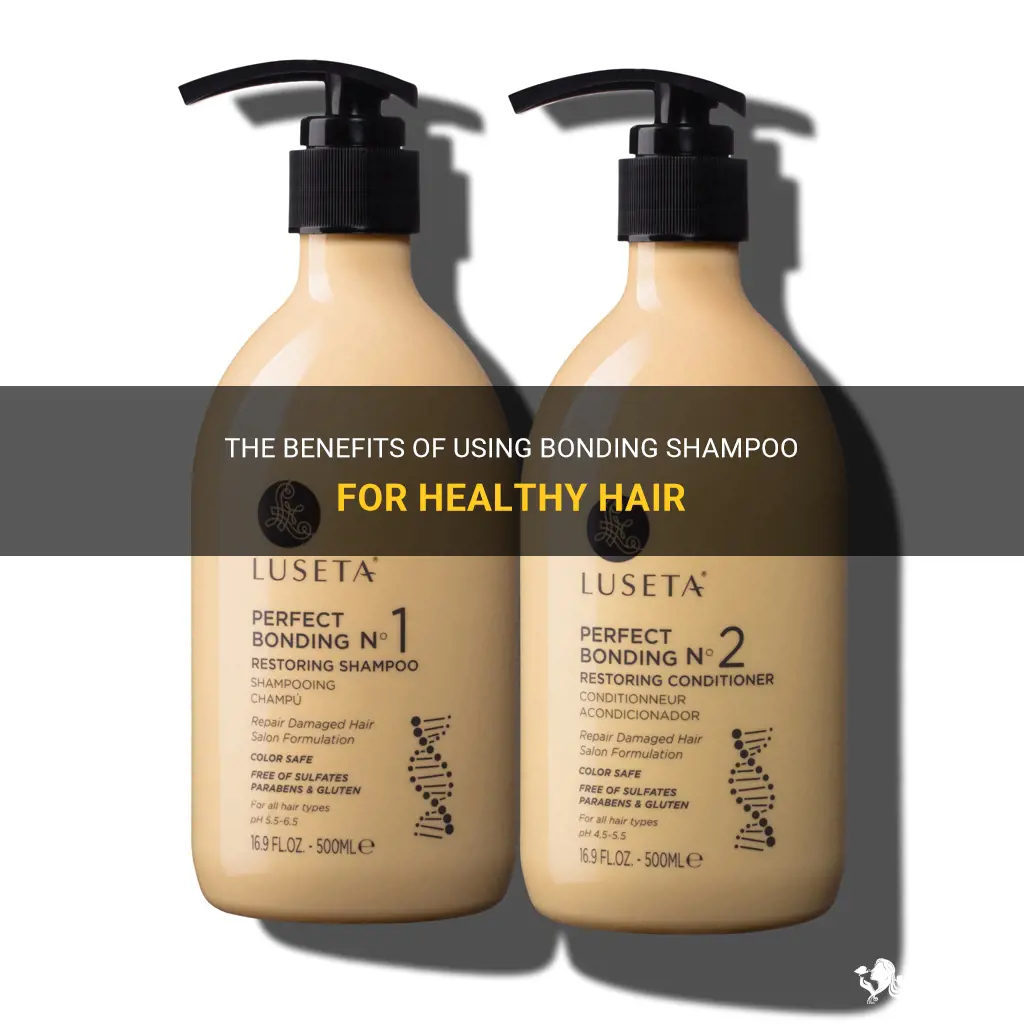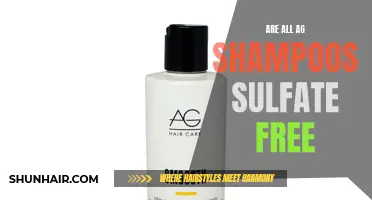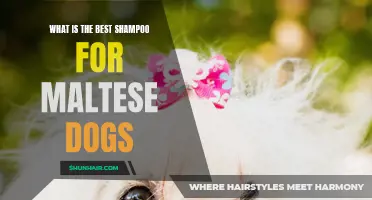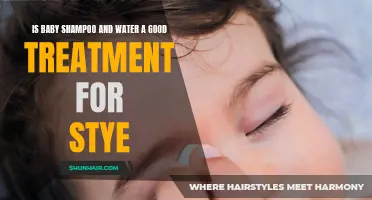
Are you tired of dealing with damaged and brittle hair? If so, it may be time to consider incorporating bonding shampoo into your haircare routine. This innovative product is designed to repair and strengthen your hair, making it the perfect solution for those with chemically treated or heat-damaged locks. With its unique formula, bonding shampoo works to rebuild and fortify the hair fibers, leaving you with healthier, shinier, and more resilient hair. Say goodbye to breakage and hello to lustrous, strong hair with the help of bonding shampoo.
| Characteristics | Values |
|---|---|
| Removes build-up | Yes |
| Restores shine | Yes |
| Strengthens hair | Yes |
| Nourishes scalp | Yes |
| Improves texture | Yes |
What You'll Learn
- How does bonding shampoo work to repair and strengthen hair?
- Can bonding shampoo be used on chemically-treated or color-treated hair?
- What are the key ingredients in bonding shampoo that contribute to its effectiveness?
- Is bonding shampoo suitable for all hair types, including oily or dry hair?
- Are there any potential side effects or precautions to be aware of when using bonding shampoo?

How does bonding shampoo work to repair and strengthen hair?
Hair damage is a common problem that many people face. Whether it's from heat styling, chemical treatments, or even environmental factors like pollution, our hair can become weak, brittle, and prone to breakage. Fortunately, bonding shampoos have emerged as a powerful solution to repair and strengthen damaged hair. In this article, we will explore how bonding shampoos work and why they are so effective in restoring hair health.
Understanding Hair Structure:
Before delving into how bonding shampoos work, it's essential to understand the structure of our hair. Hair is made up of a protein called keratin, which is responsible for its strength and flexibility. However, various factors can cause the bonds within the keratin to break, resulting in hair damage. This damage can manifest as split ends, frizz, and breakage.
The Science Behind Bonding Shampoos:
Bonding shampoos contain ingredients that work at a molecular level to repair the broken bonds within our hair. One such ingredient is a compound called Polyquaternium-7. This compound forms a protective layer around the hair shaft, strengthening it from the inside out. It also helps to reduce frizz and improve the hair's overall appearance.
Another key ingredient found in bonding shampoos is hydrolyzed keratin. This is a modified form of keratin that has been broken down into smaller fragments. When applied to damaged hair, hydrolyzed keratin fills in the gaps in the hair shaft, reinforcing its structure and preventing further damage. Moreover, it enhances the hair's elasticity, making it more resistant to breakage.
How Bonding Shampoos are Used:
To achieve the best results, bonding shampoos are typically used as part of a hair care routine. They can be used in place of regular shampoo and should be applied to wet hair. Massage the bonding shampoo into the scalp and work it through the lengths of the hair, focusing on the damaged areas. Leave the shampoo on for a few minutes to allow the active ingredients to penetrate deeply. Rinse thoroughly and follow up with a conditioner to lock in moisture and further strengthen the hair.
Real-Life Results:
Many individuals have experienced significant improvements in their hair condition after using bonding shampoos. They report that their hair feels smoother, looks shinier, and has reduced frizz. With continued use, hair becomes noticeably stronger and more resilient to damage. However, it's important to note that results may vary depending on the severity of the hair damage and individual factors such as hair type and texture.
In conclusion, bonding shampoos are a revolutionary solution for repairing and strengthening damaged hair. By utilizing ingredients that target the broken bonds within the hair shaft, these shampoos work at a molecular level to restore hair health. With regular use, bonding shampoos can significantly improve the strength, appearance, and overall quality of our hair. So, if you're struggling with hair damage, consider incorporating a bonding shampoo into your hair care routine for healthier, stronger, and more beautiful hair.
The Effectiveness of Using Rubbing Alcohol to Treat Ingrown Hairs
You may want to see also

Can bonding shampoo be used on chemically-treated or color-treated hair?
Bonding shampoo is a type of hair product that is designed to repair and strengthen the hair by rebuilding the broken bonds in the hair structure. It is often used to improve the health and condition of the hair, especially for those who have chemically-treated or color-treated hair. But can bonding shampoo be used on chemically-treated or color-treated hair? Let's find out.
Chemically-treated or color-treated hair can be prone to damage and breakage because of the harsh chemicals used during the coloring or chemical treatment process. These chemicals can strip the hair of its natural moisture and protein, leading to dry, brittle, and weak strands. Bonding shampoo comes to the rescue by helping to rebuild these broken bonds and restore the strength and health of the hair.
One of the key features of bonding shampoo is its ability to penetrate the hair shaft and repair the damaged bonds. The active ingredients in bonding shampoos, such as keratin, amino acids, and other strengthening agents, are specifically formulated to target and repair the damaged areas in the hair. This helps to strengthen the hair from within and make it more resistant to damage.
When using bonding shampoo on chemically-treated or color-treated hair, it is essential to choose a product that is specifically formulated for use on treated hair. These shampoos are typically gentler and milder to prevent further damage to the hair. They are also free of sulfates and other harsh chemicals that can strip the color or treatment from the hair. Look for shampoos that are labeled as "color-safe" or "for chemically-treated hair".
To use bonding shampoo on chemically-treated or color-treated hair, follow these steps:
- Wet your hair thoroughly with warm water.
- Apply a small amount of bonding shampoo to your scalp and massage it in gently.
- Work the shampoo through your hair from root to tip to ensure even distribution.
- Rinse off the shampoo with lukewarm water until all traces of product are removed.
- Follow up with a conditioner that is also specifically formulated for use on treated hair to provide additional moisture and protection.
Using bonding shampoo on chemically-treated or color-treated hair can provide numerous benefits. It can help to repair and restore damaged hair, reduce breakage, improve the overall strength and elasticity of the hair, and enhance the longevity of the color or treatment. By incorporating bonding shampoo into your hair care routine, you can maintain the health and vibrancy of your chemically-treated or color-treated hair.
To illustrate the effectiveness of bonding shampoo on chemically-treated or color-treated hair, let's consider an example. Sarah recently had her hair chemically straightened, but she noticed that her hair became dry and brittle after the treatment. She decided to try a bonding shampoo specifically designed for chemically-treated hair. After a few weeks of using the bonding shampoo, Sarah noticed a significant improvement in the condition of her hair. It became softer, more manageable, and less prone to breakage. The bonding shampoo helped to repair the damaged bonds in her hair, ultimately restoring its health and strength.
In conclusion, bonding shampoo can indeed be used on chemically-treated or color-treated hair. It is a valuable tool in repairing and strengthening the hair, especially after undergoing chemical treatments or coloring. By choosing a bonding shampoo that is specifically formulated for treated hair and following the proper application steps, you can enjoy the benefits of healthier and more beautiful hair.
Which DevaCurl Shampoo is the Perfect Fit for Your Hair?
You may want to see also

What are the key ingredients in bonding shampoo that contribute to its effectiveness?
Bonding shampoo is a popular hair product that is known for its effectiveness in repairing damaged hair. It contains various key ingredients that contribute to its effectiveness in bonding the hair strands and improving their overall health. In this article, we will explore the key ingredients in bonding shampoo and how they work to deliver the desired results.
- Hydrolyzed Keratin: One of the main ingredients in bonding shampoo is hydrolyzed keratin. Keratin is a protein that is naturally found in our hair and helps in maintaining its structure and strength. However, due to factors like heat styling, chemical treatments, and environmental damage, the keratin in our hair gets depleted, leading to weak and damaged hair. Bonding shampoo with hydrolyzed keratin helps to replenish the lost keratin and repair the hair shafts. It forms a protective layer around the hair strands, reducing breakage and making them smoother and stronger.
- Silicones: Silicones are another important ingredient in bonding shampoo that contribute to its effectiveness. They provide a protective coating on the hair shaft, smoothing out the cuticles and adding shine to the hair. This coating not only helps in reducing frizz but also protects the hair from external aggressors like pollution and heat damage. Silicones also form a bond with the hydrolyzed keratin, helping to seal in the repair and prolong the effects of the shampoo.
- Conditioning Agents: Bonding shampoo often contains conditioning agents like panthenol and glycerin. These ingredients help in moisturizing the hair and improving its overall softness and manageability. They act as humectants, attracting moisture from the surroundings and trapping it within the hair shaft. This hydration helps to prevent further damage and breakage, leaving the hair feeling smooth and nourished.
- Amino Acids: Amino acids are the building blocks of proteins and are essential for maintaining the health and strength of our hair. Bonding shampoo may contain specific amino acids like arginine and cysteine, which help in repairing damaged hair and promoting its growth. These amino acids penetrate the hair shaft, filling in the gaps and strengthening the hair from within. They also provide the necessary nutrients to the hair follicles, promoting healthier and thicker hair.
- Natural Oils: Many bonding shampoos also include natural oils like argan oil, jojoba oil, or coconut oil. These oils are rich in essential fatty acids and vitamins that nourish the hair and scalp. They help in restoring the natural moisture balance of the hair, preventing dryness and brittleness. Natural oils also provide a protective layer on the hair strands, shielding them from further damage and adding shine and luster.
In conclusion, bonding shampoo contains a combination of key ingredients that work together to repair and strengthen damaged hair. The hydrolyzed keratin replenishes the lost protein, while silicones provide a protective coating. Conditioning agents moisturize the hair, and amino acids promote its repair and growth. Natural oils nourish and protect the hair, adding shine and softness. When used regularly and as per the instructions, bonding shampoo can greatly improve the health and appearance of damaged hair, leaving it stronger, smoother, and more resilient.
Drying Out: The Effects of Raised Cuticles on Hair Moisture
You may want to see also

Is bonding shampoo suitable for all hair types, including oily or dry hair?
When it comes to hair care, there are countless products available on the market. One particular type of shampoo that has gained popularity in recent years is bonding shampoo. This unique formula claims to improve the overall health and appearance of your hair by repairing and strengthening the bonds within the hair shaft. But is bonding shampoo suitable for all hair types, including oily or dry hair?
To answer this question, let's first understand how bonding shampoos work. These shampoos contain ingredients that help rebuild and strengthen the disulfide bonds within the hair. Disulfide bonds are responsible for the strength and structure of the hair, and they can become weakened or damaged due to various factors such as heat styling, chemical treatments, and environmental stressors.
Bonding shampoos typically contain ingredients like keratin, amino acids, and proteins, which help to fortify these bonds and restore the hair's natural strength. This can be beneficial for all hair types, as damaged or weakened bonds can lead to hair breakage, frizz, and dullness.
For those with oily hair, bonding shampoos can be a great option. Oily hair is often prone to excess sebum production, which can lead to a greasy and weighed-down appearance. Bonding shampoos help to balance the moisture levels in the hair, preventing excessive oiliness without stripping away essential oils. Additionally, the strengthening properties of bonding shampoos can help reduce breakage and promote a healthier scalp environment.
On the other hand, individuals with dry hair can also benefit from bonding shampoos. Dry hair lacks moisture and can be prone to breakage, split ends, and frizz. Bonding shampoos help to hydrate and nourish the hair, replenishing moisture and improving its overall condition. The repairative properties of bonding shampoos can also help to seal the hair cuticle, reducing frizz and improving the hair's texture and shine.
It is important to note that while bonding shampoos can be beneficial for all hair types, they may not be the only solution for every hair concern. If you have specific hair issues such as dandruff, scalp sensitivity, or excessive hair loss, it is advisable to consult a trichologist or dermatologist for a more targeted approach.
To get the best results from bonding shampoo, it is recommended to follow a step-by-step routine. Start by wetting your hair thoroughly and applying the bonding shampoo to your scalp and hair. Massage gently to create a rich lather and work the product through your strands. Leave the shampoo on for a few minutes to allow the ingredients to penetrate the hair shaft. Rinse thoroughly and follow with a conditioner or treatment specifically designed for your hair type.
In conclusion, bonding shampoo can be suitable for all hair types, including oily or dry hair. These shampoos work by repairing and strengthening the disulfide bonds within the hair, improving its overall health and appearance. Whether you have oily or dry hair, bonding shampoo can help balance moisture levels, reduce breakage, and enhance the hair's texture and shine. However, it is important to consult a professional for personalized advice and to address specific hair concerns.
Is Oribe a Good Shampoo Choice?
You may want to see also

Are there any potential side effects or precautions to be aware of when using bonding shampoo?
Bonding shampoos have become increasingly popular in recent years for their ability to repair damaged hair and strengthen weakened bonds. However, as with any hair product, it is important to be aware of potential side effects and precautions before incorporating bonding shampoos into your hair care routine.
One potential side effect of using bonding shampoos is scalp irritation. Some individuals may be more sensitive to the ingredients in these shampoos, which can lead to itching, redness, or a burning sensation on the scalp. If you notice any signs of scalp irritation after using a bonding shampoo, it is advisable to discontinue use and consult a dermatologist.
Another potential side effect to be aware of is hair dryness. While bonding shampoos are formulated to repair damaged hair, they can sometimes leave the hair feeling dry or straw-like. To combat this, it is recommended to use a conditioner or deep conditioning treatment after shampooing to restore moisture and nourishment to the hair.
It is also important to note that bonding shampoos are not suitable for all hair types. These shampoos are typically designed for damaged or chemically treated hair, and may not provide the same benefits for individuals with healthy hair. If you have healthy hair and are considering using a bonding shampoo, it is always best to consult a hair care professional to determine if it is necessary or beneficial for your specific hair type.
Additionally, it is important to follow the instructions provided by the manufacturer when using bonding shampoos. These shampoos typically require a specific amount of product to be applied and may require a certain amount of time to be left on the hair for optimal results. Failure to follow these instructions could result in ineffective bonding repair or potential damage to the hair.
It is also worth noting that while bonding shampoos can be effective in repairing damaged hair, they cannot completely reverse the effects of excessive heat styling, chemical treatments, or other forms of hair damage. It is important to take proactive measures to prevent further damage to the hair, such as reducing the use of heat styling tools and avoiding harsh chemical treatments.
In conclusion, bonding shampoos can be a beneficial addition to a hair care routine, particularly for individuals with damaged or chemically treated hair. However, it is important to be aware of potential side effects such as scalp irritation or hair dryness, and to follow the instructions provided by the manufacturer. If you have any concerns or questions, it is always best to consult a hair care professional for personalized advice.
The Pros and Cons of Diluting Shampoo: Is It Worth It?
You may want to see also







